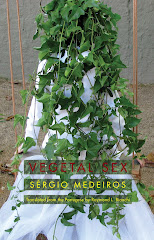
So I continue with Christian
Wiman's Lannan Award winning book and while the poetry is sparse there are somethings about the book worth commenting on.
According to the work
Wiman is very ill and he has returned to his Religion as part of the that process. I have always viewed the way religion is dealt with by poets with an eye towards the sceptical.
There are poets like Peter
O'Leary who write fabulous books with religious themes but tart it up the work with some Byzantine monk story or Buddhist Koan from the 12
th century as if to
inoculate themselves from the reality that he just might believe in transubstantiation or the trinity. There are other poets like Denise
Levertov who wait until their reputations are secure to reveal their nature. I have always chosen to be honest about what kind of poet I am- experimental yes, Pound fan yes, Catholic yes. It has cost me publications but I like to be honest.
Wiman in his book however reveals his faith- not a reflection on the faith of Paul of Gaza or St Francis but faith and belief in the face of mortality and this makes for an interesting potential conversation that i would like very much to have with Mr
Wiman. If
Wiman is a Christian then how does this effect his poetics? Or is this a personal thing?
The world of poets as spiritual seekers seems to have vanished. There was a time when poets and other seekers were
ok with the idea that a poet would also have a deep spiritual life. You look at poets as diverse as
Levertov, Merton,
Everson, Duncan & Eliot and you see a spiritual
sense that is lacking is much of the poetry written today. The question that I have for
Wiman is his new spirituality a reaction to mortality? Or does he really believe in the Incarnation?
That is the point is it not?
The power behind great poets who have spiritual depth is that they really believe it. There needs to be something there to make the poems work or they become vapid Joel
Olsteen platitudes rather than great poetry. What is it about the a Psalm sung in a Synagogue or the
Magnificat or Amazing Grace sung by believers that makes it so moving and when it is sung for secular performance it is so dry?
In the end the greatest poetry every written was religious poetry, the Psalms, Johns Gospel, Dante, St Francis, John of the Cross,
Rumi, the
Gita, the Koran. All these works have a power behind them that other work can get close to but is not the same as the real thing. So I as I continue through
Wiman's book I keep looking for the power. I
don't find HISTORY in the work as I do with my poetic antecedents- Pound-Olson-Williams-
Creeley-Bernstein. I
don't find music either so where is the power?
It is where the rubber hits the road.
You either believe or you don't.
Mozart once said that he remained a Catholic because he could not bear the idea that he would never be able to receive communion in the great Cathedrals or that the Mass would never be said for him if he left. I would say that I remain a Catholic because of the connection that I have with my ancestors and their God.
But
Wiman does not paint in bright colors like I do and like a faded fresco I keep trying to make out what he really believes? What is he saying? Why of all the books of essays this one was chosen for a
Lannan did he have to obscure things to get it published? What transcendent am I to find here? Either things are true or they are not. I choose to believe in the Incarnation because I believe in God with us. I still don't know what
Wiman believes but I hope it brings him peace?









